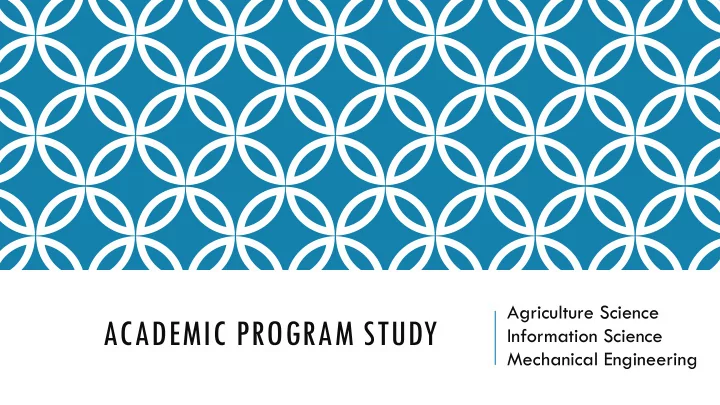

Agriculture Science ACADEMIC PROGRAM STUDY Information Science Mechanical Engineering
ESSENTIAL QUESTI0NS 1. Why consider offering different courses at the high school? 2. Why focus on agriculture, information science and mechanical engineering? 3. How has/will each area be studied? 4. Who will participate in the study? 5. What has been accomplished thus far? 6. What are the costs associated with adding courses? 7. How will the program be sustained?
STRONGER TOGETHER-LET’S MEET OUR TEAM Joshua Douglas-Student Victor Zampetti-Principal Shari Lighthall-Cornel Univ. Kelly Allen-Student Chris Groves-BOCES Todd Hyne-NY Farm Bureau Tavish Rathbone-Teacher MaryBeth Napolitano-BOCES Chris Smith-Ag Educator Julie Weeks-Teacher Marie Gerhardt-SUNY Chip Ax-SUNY Morrisville Cobleskill MaryAnne Bugbee-Teacher Sandi Prokop- NY Farm Tina Douglas-Parent Bureau Tom Huxtable-BOE Keith Schiebel-Ag Educator Carol Lewis-BOE
WHY CONSIDER OTHER COURSE OFFERINGS? WHY FOCUS ON THESE THREE AREAS? 1. Strong program becoming stronger! 2. The future of jobs � Fewer high skill high wage jobs � Jobs will require adaptability, teamwork, critical thinking skills, communication skills, work ethic 3. The Regional Outlook � Agriculture remains a leading industry in the state (nearly $6 Billion); much more diverse (Apples, wine, hops, beef, dairy, high tech) � Precisionmatics � Marcy Nanotech; SUNY IT
LET’S TAKE A LOOK AT AGRICULTURE SCIENCE 1. Site Visits � Vernon Verona Sherill CSD � Oppenheim Ephratah St. Johnsville CSD � SUNY Cobleskill 2. Research � Job Reports � Economic Reports � Student Survey
OUTREACH VISITS VERNON-VERONA-SHERRILL – KEITH SCHIEBEL � CASE curriculum � Course offerings- food science in maple, intro to AFNR, Ag business, Principles of Ag Science, Ag mech./maple production, intro to retail sales, future-Envir. Science, food science safety, ag R&D � Advisory committee � Year round � FFA officers develop next round of officers OPPENHEIM-EPHRATAH-ST. JOHNSVILLE – CHRIS SMITH � Case curriculum � Course offerings-small engine repair, plant science & technology, metal fabrication & welding, exploring ag science, careers through leadership, animal science & technology � Advisory committee � College credit with SUNY Cobleskill & Fulton-Montgomery CC
AGRICULTURE EDUCATION Agriculture Education is a systematic program of instruction available to students desiring to learn about the science, business, and technology of plant and animal production and/or the environmental and natural resources systems. Agriculture Education prepares students for successful careers and a lifetime of informed choices. Agriculture Education envisions a world where all people value and understand the vital role of agriculture, food, fiber, and natural resources systems in advancing personal and global well-being. Future Farmers of America – FFA – is integral to the instruction of Agriculture Education .
AGRICULTURE EDUCATION PROGRAM 1- Classroom instruction 2- Supervised work experience 3- Integrated student leadership development activities through the FFA
AGRICULTURE, FOOD AND NATURAL RESOURCES CAREER CLUSTER Agribusiness Systems Animal Systems Biotechnology Systems Environmental Service Systems Food Products and Processing Systems Natural Resource Systems Plant Systems Power, Structural and Technical Systems
AGRIBUSINESS SYSTEMS — the study of business principles, including management, marketing and finance, and their application to enterprises engaged in Agriculture, Food and Natural Resources
ANIMAL SYSTEMS the study of animal systems, including life processes, health, nutrition, genetics, management and processing, through the study of small animals, aquaculture, livestock, dairy, horses and/or poultry
BIOTECHNOLOGY SYSTEMS the study of data and techniques of applied science for the solution of problems concerning living organisms
ENVIRONMENTAL SERVICE SYSTEMS the study of systems, instruments and technology used in waste management and their influence on the environment
FOOD PRODUCTS AND PROCESSING SYSTEMS — the study of product development, quality assurance, food safety, production, sales and service, regulation and compliance, and food service within the food science industry
NATURAL RESOURCE SYSTEMS the study of the management of soil, water, wildlife, forests and air as natural resources
PLANT SYSTEMS — the study of plant life cycles, classifications, functions, structures, reproduction, media and nutrients, as well as growth and cultural practices, through the study of crops, turf grass, trees and shrubs and/or ornamental plants
POWER, STRUCTURAL AND TECHNICAL SYSTEMS the study of agricultural equipment, power systems, alternative fuel sources and precision technology, as well as woodworking, metalworking, welding and project planning for agricultural structures
SUNY COBLESKILL
STUDENT BENEFITS Developing students that have � Basic skills � Problem solving � Soft skills- � Confidence � “MacGyver” factor � Communication skills � Non-high maintenance employee FFA � Mission – FFA makes a positive difference in the lives of students by developing their potential for premier leadership, personal growth and career success through agricultural education � BUILDING LEADERS BUILDING CAREERS BUILDING AGRICULTURE
COST AND SUSTAINABILITY 1. 1.0 FTE Teacher; 1.0 FTE Teacher Assistant � $80,000 $35,000 2. Supplies and Training (CASE) � Up to $30,000 per course (3) $10,000 3. Equipment � $50,000 4. Transportation/Site Based Work Experiences ($5000) 5. FFA stipend ($3500) and activities ($5000) 6. Total-$278,500 (Year 1) 7. Year Two -$226,950 (supplies, equipment) 8. Sustainability-Student Survey/Role of FFA/Role of MS
FEEDBACK AND QUESTIONS 1.Let’s hear from other members of the team… 2.Questions and comments…
3:30 PM WEDNESDAY, JANUARY 25 HS Lecture Hall Happy Holidays!!!
Recommend
More recommend